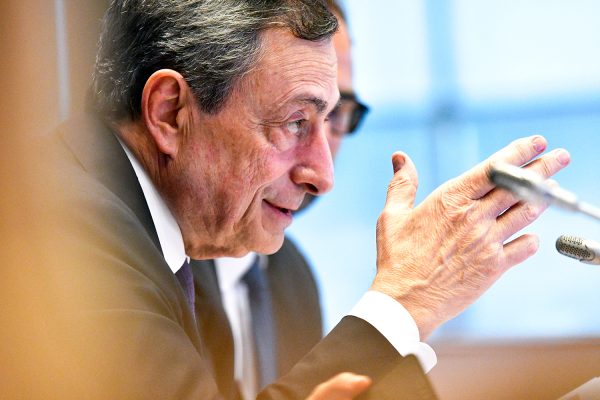
Mario Draghi is off to a good start. The former central banker has won the support of Italy’s major political parties to form a government and he understands the reforms it needs to undertake.
His challenge will be convincing the parties to see those reforms through.
Receiving more than €200 billion from the EU’s €750 billion coronavirus recovery fund should help. A chunk of the money will go to vaccinating Italy’s population of 60 million, but there will be more than enough left over to invest in long-term growth.
Money isn’t everything, though. Bringing Italy’s economy back to life after it shrunk almost 9 percent in 2020 will require making the sort of choices its politicians have avoided for years.
Energy and infrastructure
In his inaugural address to the Senate, Draghi proposed to invest in renewable energy, including hydrogen; expand broadband Internet and high-speed rail; and build more charging stations for electric cars.
He cautioned against too much state involvement and argued for investments in research and development as well as education and training, and a stable tax regime.
Italy has the second highest industrial production in the EU after Germany. It exports cars, clothes, furniture, machines and pharmaceuticals. It is the largest producer of wine in the world and a major exporter of cheese, olive oil and other agricultural products.
But much of Italy’s industrial and commercial activity is concentrated in the north, where incomes and living standards are comparable to France, Germany and the Low Countries. The south is a different country. It is plagued by low birth rates, high unemployment and brain drain. One in three Italians lives south of Rome, but the region produces just a quarter of the country’s GDP.
Faster Internet and rail could help mend Italy’s north-south divide. Currently the high-speed rail network doesn’t extend farther south than Naples and one of the most divisive issues in the last government was the high-speed rail connection between Turin and Lyon. A faster line between Rome and Palermo is more important.
Italy ranks third in Europe in green energy consumption, after France and Germany. It has invested in nuclear, solar and wind, and is poised to make strides in the coming years. But the International Energy Agency cautions that regulatory uncertainty could discourage private-sector investment. Italy has a strategy in place for renewables through 2030. Draghi should avoid tinkering with it and plan for the period after.
Italy spends less on tertiary education that its neighbors. Only 27 percent of Italians in their thirties have a higher degree, the second-lowest rate in the eurozone, where the average is 40 percent. Draghi should increase spending on trade schools and universities.
The reason investments in education, energy and infrastructure have lagged is that they don’t pay off in the short term. Draghi, a technocrat, doesn’t have to worry about winning the next election. Hopefully he’ll give parties cover to forego stop-gap measures and prioritize improving Italy’s competitiveness.
Labor market
Draghi also called on lawmakers to close gaps in the labor market, including salary gaps between men and women, and to improve training and career prospects for Italy’s younger generation.
There is no time to waste. Italy is failing its next generation. Just 45 percent of Italians under the age of 30 were in work before the pandemic, compared to a eurozone average of 63 percent. Of those, eight in ten could only find part-time work. Licensing requirements make it almost impossible for young Italians to start a career as a lawyer, notary, pharmacist or even a taxi driver.
The result is a two-tiered labor market where young workers can’t find job security and older workers are expensive and impossible to lay off. Average real incomes have barely grown in two decades compared to 25-percent growth in France, Germany and Spain. Well-educated, ambitious Italians look for job opportunities elsewhere in the EU.
Populist parties have convinced many the problem isn’t Rome but Brussels. Italy is the only country in Europe where the young are less supportive of the European Union than the old. But it has consistently ignored admonitions of the European Commission to liberalize its labor laws.
One of Draghi’s predecessors, Matteo Renzi, painstakingly negotiated reforms within his center-left Democratic Party and with trade unions to make it slightly easier for firms to hire and fire workers. Changes were not applied to anyone in work and tax benefits were provided to businesses to hire workers under the new rules. Still they were overturned by the next government.
The problem is that labor unions and professional associations don’t want reform, because the status quo protects their members from dismissal and competition, and they are better organized. Draghi isn’t beholden to special interests, but many of the politicians whose support he needs are.
Public administration
The third area Draghi identified for a shakeup is public administration. He mentioned digitalization, fighting tax evasion, simplifying the tax code and streamlining judicial procedures.
Italy is one of the worst countries in the developed world to start and run a business in. It takes too long to get permits, to enforce contracts and to resolve bankruptcies. Courts are notoriously slow. They take 1.5 years on average to reach a verdict, and two more years for appeals. It is one of the reasons foreign investors prefer to put their money elsewhere.
Tax evasion is between two and three times higher than in France, Germany and Spain. Corruption is at Balkan levels. Italian bureaucracy is slow and obstinate. Even when reforms are enacted by parliament, civil servants and local officials can take years to implement them.
It is probably too much to hope for breakthroughs in all three areas, but if Draghi could move the needle in even one it would make his appointment worthwhile.
